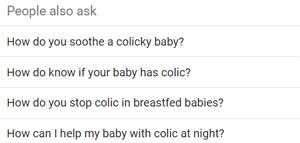Issue #1310 May 21, 2019
Publisher: Joan Stewart
“Tips, Tricks and Tools for Free Publicity”
In This Issue
- Don’t Answer “What If” Questions
- Today: How to Get Booked on National TV
- How to Rank Well for Voice Search
- Hound Video of the Week
This Week in the Hound House:
I’m proud of myself for reaching Day 12 on my quest to rid sugar from my diet. No more headaches from going through withdrawal. Once I started reading labels more carefully, I learned that sugar pops up in the most unexpected places like dill pickles, canned tomatoes, even canned black beans. But it’s not just “sugar” I’m looking for on the label. Here’s a list of 56 different names for sugar.
1. Don’t Answer “What If” Questions

During media interviews, beware of the “What if” question or any question that asks you to speculate about something. It sounds like this, and it can throw you off-guard:
“What if you open your children’s clothing store and find there’s too much competition downtown? What will you do?”
“What if someone sues you for using their name in your crime novels? Are you prepared to fight a lawsuit?”
“What would you do if those employees who inhaled the fumes die? Will you make restitution to their families?”
Never speculate. Instead, you can say, “I don’t speculate about things that might or might not happen. I can tell you, however, that….” And then bridge to your key message or to a point you want to make that ties into the question.
For example, if you own the children’s clothing store, you can say this: “I can tell you, however, that we’re the only children’s clothing store downtown that specializes in organic clothing for children who suffer from eczema, psoriasis, and allergies. Our marketing research tells us there’s a huge demand for that our type of retail store within a 50-mile radius.”
Questions that ask you to speculate aren’t necessarily trick questions. But if you want to ace your media interviews, you need to anticipate what reporters might ask.
To do: “Special Report #2: Questions You Can Expect Reports to ask During an Interview (Including Nasty, Hostile Ones)” provides not only the questions but explains how to answer them. A steal at only $7. Don’t be tongue-tied. Order here.
#MediaInterviews #CrisisCommunications
2. Today: How to Get Booked on National TV

When you pitch a TV producer, you’re pitching someone with a certain mindset who’s looking for golden nuggets of information within the pitch.
They’re all asking themselves, “Would this person make viewers stop surfing and put down the remote?”
If they’re interested, they might ask you one question you must know how to answer because it could determine whether you get onto their shows or you end up in the rejects pile.
Find out what it is today when four producers and guest bookers for ABC, CBS, NBC, and Fox share their best tips on how to move to the head of the pack.
It’s at 2 and 7 p.m. Eastern today, sponsored by Steve Harrison.
You will learn:
- How to understand the mindset of national TV producers and how to encourage them to book you as a guest.
- The strategy a husband-and-wife team used to land a 7-minute segment on the Today Show.
- What you should send TV producers (and what you shouldn’t).
- The most important question you must be able to answer to land a TV appearance.
- The biggest mistakes to avoid when pitching TV producers (including ones that could get you black-balled forever!).
- Case histories of three authors and entrepreneurs and the strategies they used to get on top TV shows.
You can use what you learn to get booked onto other big TV shows too, not just these.
To do: Register for the free call with influencers from the Rachael Ray show, The Wendy Williams Show, Live with Kelly & Ryan, and Telepictures Productions using this affiliate link. If you have trouble registering, hit Reply and I’ll help you.
3. How to Rank Well for Voice Search

“Hey Siri, how can a mother help a colicky baby?” asks a reporter who’s writing a story for Parents magazine.
If you’re a parenting expert who has written a blog post on “How mothers can help colicky babies,” your article has a chance of being found in voice search.
Here’s a super tip from Website Magazine on how to rank well when people are searching by voice, as well as by typing their questions into the search engines.
One out of five voice searches are prompted by a combination of just 25 keywords. In fact, the word “how” is part of a little more than 8 percent of all voice search queries.
To align better with voice search, your content should be conversational. You should structure the keywords in them in the way you talk because people are searching by talking. More specifically, the content should be focused on answering queries with the words: who, what, when, where, why and how.
Why is this important? Because by next year, one-half of all search sessions will be voice-activated through voice assistants like Amazon’s Alexa, Apple’s Siri, Microsoft’s Cortana, Bixby, and Google Assistant. Also, when people search, they see related questions people have asked. Yours could be among them.
Think frequently asked questions. What questions do your followers ask you? Create content that answers them.
To do: Read more in Website Magazine’s article “SEO for Voice: Everything you need to know about where we are and where we’re headed.”
#VoiceSearch #Siri
4. Hound Video of the Week
Watch this cute pooch choose its own dog treats at the pet store, put them into the basket and pay the cashier.
[Tweet “#PublicityTips — Don’t Answer “What If” Questions #MediaInterviews #CrisisCommunications”]

Hi Joan:
I ‘m your fan, Bambi.
Screamed out “yikes” when I read your link to sugar in foods….too upsetting to go on.
I’m avoiding sugar, too, and now here you go and add all those other sugars to my avoid list!
Thanks for your diligence! I expect to see a new, slimmer headshot!
Bambi, sorry to make your sugar-free journey more difficult. Rest assured I don’t pay that much attention to all the other sugar names, just the most popular ones. And only if they’re listed among the first five ingredients.